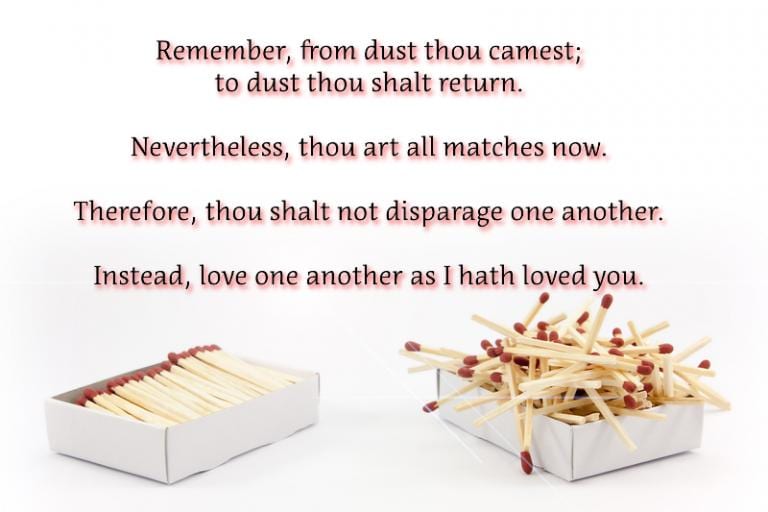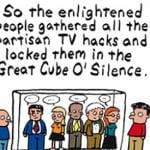Liberals need conservatives; otherwise, things fall apart. Conservatives need liberals; otherwise, things get stuck. Healthy societies, held together by the cultural glue of shared assumptions–the necessary conservative part of life–can also bring in new ideas with lowered levels of fear–the necessary liberal part of life. But it’s easier to push Jesus over a cliff instead.

A woman, who had walked away from a tight-boundaried religious community, said recently, “I need a tribe where I can be safe.”
Her comment spoke to a universal human need: we all want to participate in a community of like-minded people. There, people don’t have to use energy explaining themselves, defending themselves, or keeping close watch over everything they say because the common beliefs keep them safe.
Tribes conserve energy.
This is not bad–no condemnation here — just human nature at work. By definition, tribes are a group of people who share basic assumptions of life. We know the others think the way we do.
Tribes, by nature conservative, make us comfortable.
Those common beliefs range from economic to political to religious to cultural. For the most part, they remain unexamined and unquestioned. However, let someone, i.e., a liberal, within the community question those beliefs, and the condemnation will heap down. Suddenly safety disappears.
Note how that played out in the fascinating vignette of the beginning of Jesus’s public ministry as seen in Luke, Chapter 4. After his baptism and the blessing of the Holy Spirit, Jesus returns to his hometown. He attends the usual synagogue gathering and is asked to be the reader of the day.
He reads from Isaiah,
“The Spirit of the Lord is upon me, because he has anointed me to bring good news to the poor. He has sent me to proclaim release to the captives and recovery of sight to the blind, to let the oppressed go free, to proclaim the year of the Lord’s favor.”
And he rolled up the scroll, gave it back to the attendant, and sat down. The eyes of all in the synagogue were fixed on him. Then he began to say to them, “Today this scripture has been fulfilled in your hearing.”
 A few minutes later, after people started to murmur about this inappropriateness of this unimpressive carpenter’s son speaking so boldly, Jesus speaks again:
A few minutes later, after people started to murmur about this inappropriateness of this unimpressive carpenter’s son speaking so boldly, Jesus speaks again:And he said, “Truly I tell you, no prophet is accepted in the prophet’s hometown. But the truth is, there were many widows in Israel in the time of Elijah, when the heaven was shut up three years and six months, and there was a severe famine over all the land; yet Elijah was sent to none of them except to a widow at Zarephath in Sidon. There were also many lepers in Israel in the time of the prophet Elisha, and none of them was cleansed except Naaman the Syrian.”
At this point, all hell breaks loose. Jesus’s fellow synagogue attendees try to throw him over a cliff. Seriously.
But why? Because he just said that God, in the name of freeing the oppressed, had a lot more than Jews alone in mind. Those hopeful words included the hated Gentile community as well. In other words, he expected to open the kingdom of heaven to those OUTSIDE the accepted tribal boundaries.
Indeed, Jesus was a social AND religious liberal. He demonstrated that he would break boundaries between clean and dirty. And the people were not happy.
Conservatives keep us safe; liberals transform society
Remember, our tribal boundaries, i.e., our conservative natures, keep us safe. We all need someplace to belong, to be part of a community. Furthermore, most human beings fear change to some extent because changes cost energy, lots and lots of mental and emotional and physical energy, energy needed elsewhere for necessities and perhaps pleasures.
And it’s mostly the liberals who push changes and bring about societal, an/or ecclesiastical discomfort.
Look at some of the radically new, i.e., liberal, ideas that have transformed society for the better. Consider universal public education, clean water for everyone, vaccinations for scourges like smallpox, measles, chicken pox and shingles, antiseptic techniques in surgery, drugs tested for purity and efficacy, child labor laws, the ability to vote for those other than landed white males, desegregation.
Each of these genuinely good, yet liberal, ideas saw strong opposition before finding near-universal acceptance. Nonetheless, healthy societies, held together by the cultural glue of shared assumptions–the necessary conservative part of life–can also bring in new ideas with lowered levels of fear–the necessary liberal part of life.
This state is called “balance.”
Liberals need conservatives; otherwise, things fall apart. Conservatives need liberals; otherwise, things get stuck.
Each new idea named above forced society to examine commonly shared assumptions. These included assumptions about the causes of infectious illnesses, the necessity of a widely well-educated populace, and the nature of democracy when excluding certain people groups from the definition of being fully human and thus endowed with inalienable rights.
In each case, those previously unexamined shared assumptions had to be held to the light to reveal the inevitable flaws. This is a continual process which societies–and religious organizations–must undergo.
Right now, our society and our religious institutions are re-examining assumptions about the nature of human sexuality. The implications of changing those assumptions affect every part of life.
The razor’s edge of grace vs law
As an active pastor, I often reminded my congregation that all live on the razor’s edge where we seek a comfortable balance between law and grace.
With law, we treasure the way we did things in the past and trust that the rules of the past also inform the rules of the future.
With grace, we recognize that God is continually challenging us to live more fully into a world of radical forgiveness, inclusion and the mystery of the unknown.
We are always falling off that razor’s edge, simply because it is impossible for us to stay there. It takes too much energy to maintain our balance.
Tevye, in Fiddler on the Roof, tells us that for balance we must hold firmly to “Tradition!” Tradition! Those traditions, carefully conserved by societies that trust them to keep things stable, provide solid foundations. Until they don’t. They stop working when unstoppable outside forces muscle in or intriguing and attractive new ideas seep in.
Those forces and ideas wreak havoc on formally balanced traditions. New ways of balancing, have to be formed. That how adaptive societies and organizations, secular and religious, endure.
Liberals need conservatives; conservatives need liberals
Now, besides Jesus and his liberal message of inclusion, two primary groups push for societal change. The first are those who sense the call to fight for the oppressed. They tend to be secure enough about both the present and the future to navigate the unsteady waters of change.
The second are those so oppressed themselves that they are desperate for a welcoming space within the formally non-welcoming tribe. The oppressed have nothing to lose by continually pounding on the doors until they break them down.
Let’s picture this dynamic in the current world of conflicted Methodism: Those on the outside, the ones with nothing to lose, i.e., the GLBTQI+ community, along with their liberal defenders, i.e., people like me who feel genuinely called to go to battle for the oppressed, now stand toe-to-toe with those who are fighting to the death to preserve their traditions.
Both positions have the Bible on their side. If operating from a text-only basis, then those engaging in non-heterosexual encounters do deserve death, or at the very least, a consistent reminder that their ways are wicked in the sight of God and humanity. If operating from a larger theological basis, like Luke 4 and Acts 10, then open the doors to the formerly unclean and let them be labeled clean and whole.
The battle was no different when fighting for or against slavery. On a text-only basis, slavery appears to be smiled upon by God or at least not overtly condemned. On a theological basis, it is a grievous wrong to do this to another human being.
Same with women’s ordination: on a text-only basis, women should keep their heads covered, their mouths shut, and their legs open so they can have as many babies as possible and perhaps be saved by childbearing. On a theological level–it’s a whole different story.
The text-only basis serves the conservative community exquisitely well. Small snippets of Scripture are easy to remember and to use as comforting and stabilizing stakes in the ground.
Wider theological thinking serves the liberal community equally well. It gives space for creativity and legitimate justification to fight oppression that has been long silently approved by the unspoken assumptions of the larger community.
We need them both.
We need to acknowledge our often legitimate fears of change. We also need to acknowledge our need to change and the massive discomfort it causes. The more uncomfortable things become, the more most people long for order, often an externally imposed order. That need for order often drives people to embrace some sort of religious fundamentalism, which exacerbates the tension.
Nothing stays the same
The need for religious fundamentalism is NOT BAD. We need our common fundamentals. But without those fundamentals facing the questions that the liberals and desperate outsiders periodically insist upon, we cannot stay alive because change is itself fundamental to life. Nothing remains in stasis.

On a recent trip to the Amazon, I heard a series of lectures by a geologist to help better understand the longterm history of the area. His good work reminded me of our physical reality: nothing stays the same; nothing stays stable; we are all in a state of flux.
Some people, some species, survive the changes and become stronger and better adapted to the new realities. Some do not.
It’s the same with institutions. Some adapt and thrive in new realities. Some do not.
Historically, the Methodists have been able to embrace societal changes and still thrive. We no longer support racial segregation; we ordain the divorced and just as readily perform marriages for divorced parishioners; we enthusiastically ordain women.
All of those radical changes faced giant opposition. All were necessary to remain faithful to the Holy Scriptures.
Stop the blame/counterblame game
Can we do this again with the questions of human sexuality?
Yes, we can. But the current rhetoric of blame/counterblame, of condemning people to eternal damnation, or screaming that they are “wrong,” or worse, “unbiblical,” must stop. Right now.
The liberals among us MUST acknowledge the importance of conserving traditions. The conservatives among us MUST acknowledge that the liberals have something legitimate to say.
We are better with each other than we are without each other. It might lower tensions if we splinter into “separate but equal” camps. But it will also certainly lower any hopes of holiness or Christ-likeness if we do.
When the head says to the heart, “off with you!” both die. When the hand chops off the foot, the hand also loses the blood necessary for life.
When I say to those who hold opinions seriously different from mine, “Go away, form your church, free me from having to be in a relationship with you,” then I lose.
I need those opposing points of view. And they need mine.
We can do this. But will we? It’s far, far less safe to stay together. It’s far, far easier and more comfortable to split, to hide behind our tribal boundaries, But it ain’t right.
A split is exactly the opposite of what Jesus proclaimed in Luke 4. But then again, the religious people did try to push him over a cliff.
Easier to get rid of the Savior than to live with radical grace toward one another.
Photo Credits:
© Benjamin Albiach Galan | Dreamstime.com, modified by Christy Thomas
Photo By Fama Clamosa – Own work, CC BY-SA 4.0,
© Andres Rodriguez | Dreamstime.com, modified by Christy Thomas













